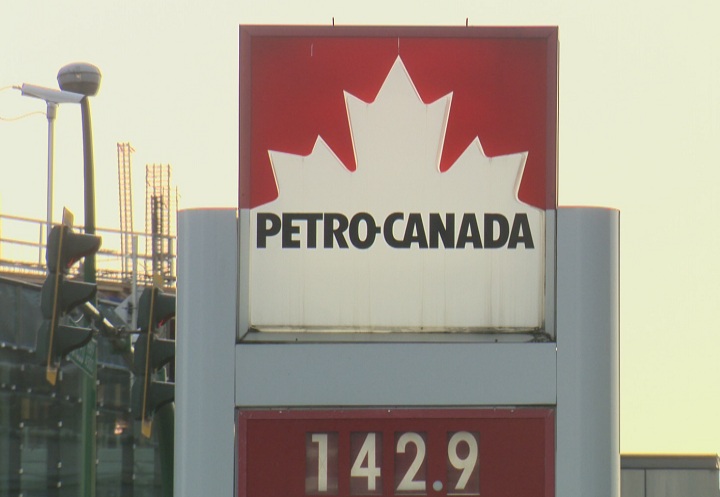Many motorists across Ontario and Quebec woke up to much higher gasoline prices on Wednesday, just as the Easter long weekend approaches. But all of Canada is in for some pain at the pump this summer, according to Dan McTeague, an analyst at GasBuddy.com

“This is going to be the most expensive year, bar none, since 2014,” he told Global News.
What’s pushing up gasoline prices?
READ MORE: London gas prices set to rise by at least six cents/litre overnight
U.S. drivers
U.S. demand for gasoline “looms large” on gasoline prices this year, said McTeague.
“Americans, with a stronger economy, are taking back to their vehicles, driving further and breaking through three years of records,” he noted.
And while plentiful supply is making crude oil cheaper, limited refining capacity means higher U.S. consumption of gasoline will have a sizable impact on prices at the pump, according to McTeague. Gone are the good old days of 2015 and 2016 of high gasoline inventories.
READ MORE: Gas prices are up in Montreal, how did that happen?
The loonie
Not only are lower oil prices failing to translate into cheap gasoline, they’re contributing to making it more expensive for Canadians.
When oil markets are saturated, the loonie tends to weaken, but the price of gasoline in Canada is pegged to price benchmarks denominated in U.S. dollars. With the Canadian dollar trading at around 75 cents to the greenback, the exchange rate is magnifying the impact of price increases right now.
READ MORE: Toronto gas prices expected to hit 121.9 cents/litre by midnight
Provincial governments
Government is also to blame for pricier fuel. At least four provinces have increased taxes over the past year, noted McTeague.
Newfoundland and New Brunswick hiked up HST by two percentage points, with Newfoundland topping that with a gasoline tax hike of 22 cents per litre.
And then, of course, Alberta rolled out its carbon tax, which amount to an additional 4.7 cents a litre including GST, and Ontario, its cap and trade system, which works out to an increase of 4.4 cents per litre including HST, according to McTeague.
READ MORE: Gas prices surge to $1.429/litre in parts of Metro Vancouver
Seasonal factors
Surging U.S. demand and a weak loonie will compound a number of seasonal factors that make gasoline pricier in the spring and summertime.
Canada switches to a more expensive gasoline blend in the summer
What makes filling up your car in the spring and summer more expensive than in winter is the fact that your tank is actually gobbling up a fancier type of fuel when the weather is warmer.
Summer-spec gasoline contains a number of expensive elements that stabilize it and prevent it from expanding and evaporating at higher temperatures, said McTeague.
In Canada, switching over to summer gasoline is mandatory by April 15, with the switchover to winter gasoline starting on Sept. 15.
But April 15 is the date by which summer gasoline has to be in people’s gas tanks and gas stations’ storage tanks, meaning that the effective switchover at the refinery level needs to happen sooner, said McTeague.
READ MORE: Despite soaring gas prices, February inflation slips to 2%
When that happens varies from year to year and across Canada, which explains why different parts of the country have seen gas prices increase at different times over the past few weeks.
Ontario, Quebec and Atlantic Canada, for example, rely on a benchmark price that’s tied to the New York Harbor spot price for gasoline. That jumped by about 15 cents per gallon on April 10 because of the switchover from winter- to summer-blend gasoline. As a result, several Canadian gas stations saw an increase of about six cents per litre as of April 12.
The fact that this happened right before a long weekend was an unhappy coincidence, said McTeague.
Most of Western Canada, on the other hand, uses benchmark prices tied to the Chicago spot market for gasoline.
READ MORE: Canadian families could spend $1,600 more this year as grocery, gas bills rise
Springtime maintenance
Another seasonal factor that drives up gasoline prices as the snow thaws is springtime refinery maintenance, said McTeague.
Prices on the Chicago spot market for gasoline, for example, went up about 20 cents per gallon about three weeks ago because of spring maintenance that “created a bit of crimp on potential supply,” noted the analyst. The effects rippled across gas stations throughout most of Western Canada.
The Lower Mainland in British Columbia also saw a gasoline price spike earlier this month because of refinery maintenance.
Canadian drivers
Finally, travelling and boating in Canada itself during the warm season also contribute to drive up demand and prices.
READ MORE: Tips to save on gas, as prices at the pump soar across Winnipeg




Comments